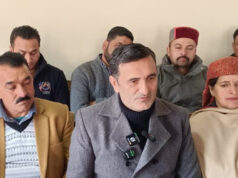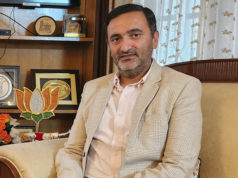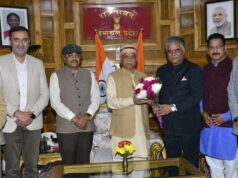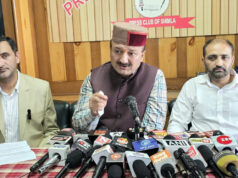Himachal Pradesh BJP has strongly criticized present form of the National Food Security Ordinance and its timing of launch. In a press communiqué, Chetan Bragta, former banker and now heading BJYM Social Media National Campaign, ridiculed the Ordinance and termed it just another major political step ahead of parliamentary election and accused them for purposefully giving a blind eye to huge grey areas of the bill.
Chetan questioned the implementation of Ordinance and claimed that UPA has adapted completely an undemocratic route by bringing Food Security Bill as an ordinance. It is relegation of parliament on a very crucial bill for poor and which has wider implications for agriculture.
He said that the 117 million small and marginal farm families with population of 585 millions constitute almost 78 per cent of the rural population. They now produce food for themselves, and also for others. He believes that under the Food Security Bill, most of their families will qualify for subsidised food grains. And they will get grain supply at less than 1/8 of the price at which they produce and sell grains to the government. If the government would supply them grain at 1/8 price, why they till should and toil on their land and produce 51 per cent of national food using 46 per cent of the cultivated area, particularly when their cost of cultivation per acre as compared to medium and large players is higher.
Rice and wheat cultivation is the most difficult and least gainful farm operation which is already haunted by shortage of labour and skyrocketing wage and input costs. Giving highly subsidised foodgrains to small and marginal farmers is the best way to dissuade them from farming for their family’s food supplies. The Food Bill is bound to encourage the small and marginal farmers to go for easy alternatives like commercial crops and horticulture. Most States are deficient in food production. If in those States small and marginal farmers shift away from foodgrains, the country will face huge dent in food security.
India’s supply chains are afflicted by inadequate infrastructure and its distribution channels riddled with corruption. Food grains are produced in surplus in the country, but rot due to the lack of sufficient cold storage year after year. And yet, instead of dealing with this recurrent underlying problem, the bill seems to focus on the superficial aspects of food security. Without paying attention to effective distribution, the bill will simply exacerbate the problem of food wastage while millions continue to starve.
India’s underperforming PDS system – The government intends to use the Public Distribution System for delivering subsidies to the poor. The PDS is already used to deliver food subsidies to the poor but around 51% of the food delivered that way is currently lost to leakages. It is sold on the open market for a higher price. Current leakage from the PDS, variously estimated by researchers at 40 to 55 percent.
BJYM leader also asked the government to explain how it plans to finance this policy which was estimated to require Rs. 95000 crore rupees per year. And it is estimated to increase further to Rs. 3 lakh crores.
India is already spending close to Rs 1.16 lakh crore on schemes that are listed as “entitlements” under the FSB. For instance, food subsidy (Rs 85,000 crore), mid-day meal (Rs 13,215 crore), Integrated Child Development Scheme (Rs 17,700 crore) and maternity entitlements (INR 450 crs).
Chetan said that the country needs legislation that allows farmers to profit economically and grow autonomous, instead of forcing them to further depend further on the state. The government would do better to provide market incentives, not charitable hand-outs. He feared that the very low prices of the subsidized food will distort the market and farmers who can’t sell to the government-assured program will lose out on the open market because prices will be forced down.
Reform in Agriculture should be guaranteed before food bill, says NAC Member N.C. Saxena (former secretary of the Planning Commission). He says, “Passing the bill is a necessary but not a sufficient condition for reducing hunger. India requires a significant increase of targeted investments in irrigation, rural electrification, nutritional programmes, clinics, disease control, rural roads and sanitation,”
Bragta feared that implementing this bill could widen the already swollen budget deficit next year, increasing the risk to its coveted investment-grade status. The government has already budgeted 950 billion rupees for the scheme in the current fiscal year ending March 2014. If the bill is passed, it will need to come up with as much as 1.3 trillion rupees in 2014/15, adding to a total subsidy burden that already eats up about 2.4 percent of gross domestic product. Moreover, UPA Govt has not come out with a detailed plan related to finances required to meet the bill objectives. It becomes further serious when we are already in the midst of Fiscal deficit and CAD.
Finally, a fundamental issue is whether the Bill can achieve the stated purpose of food security. We believe true food security can come about only through a combination of various factors, the first of which is much higher agricultural productivity and production. The next is a population which has sufficient jobs and earnings to pay (whether directly or through government revenues) a fair remunerative price to the farmer. The final link is an efficient storage and distribution mechanism which minimises losses and leakages. If these issues are not scientifically addressed, the food security would amount to an unaffordable dole.











